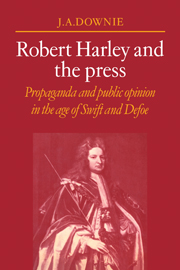Book contents
- Frontmatter
- Contents
- Preface and Acknowledgements
- Author's note
- Introduction
- Part one 1689–1708
- 1 The propaganda of court and country
- 2 The paper war of 1701
- 3 Harley and Defoe
- 4 The Memorial of the Church of England (1705): a case study
- Part two 1708–1714
- Epilogue: impeachment and after
- Abbreviations
- Notes
- Index
1 - The propaganda of court and country
Published online by Cambridge University Press: 07 October 2011
- Frontmatter
- Contents
- Preface and Acknowledgements
- Author's note
- Introduction
- Part one 1689–1708
- 1 The propaganda of court and country
- 2 The paper war of 1701
- 3 Harley and Defoe
- 4 The Memorial of the Church of England (1705): a case study
- Part two 1708–1714
- Epilogue: impeachment and after
- Abbreviations
- Notes
- Index
Summary
At the Revolution, Robert Harley was a Shaftesburian whig of the old school. During the upheaval he raised a troop of horse at his own expense and declared for the Prince of Orange. One of his father's fondest memories was of being ‘in arms together for the Gospel and the country’. On 6 April 1689 Harley was elected to parliament for the pocket borough of Tregony in Cornwall. He entered politics on a firm Revolution foot: his relatives and his earliest political associates were recognised to be partisan whigs. In the Convention Parliament he distinguished himself as a radical, speaking against a lenient indemnity bill, and supporting the Sacheverell amendment to the corporation bill, which would have disabled those who had had any part in the surrender of borough charters in the previous reigns from exercising their right to vote for a period of eight years. Harley was ‘notable, and made speeches’; clearly ‘a dangerous person’. ‘It is plain now there is a party setting up to play the old game’, he warned his wife, ‘the same that was in King Charles's and King James's time’. In the 1690 elections he was branded as a common wealthman, an anti-monarchist, and he was unseated by malpractice at New Radnor, and by tory electioneering at Tregony. He regained his place in parliament on petition. Just over a month later, on 26 December 1690, he was chosen by the Commons to be a commissioner of public accounts.
- Type
- Chapter
- Information
- Robert Harley and the PressPropaganda and Public Opinion in the Age of Swift and Defoe, pp. 19 - 40Publisher: Cambridge University PressPrint publication year: 1979



